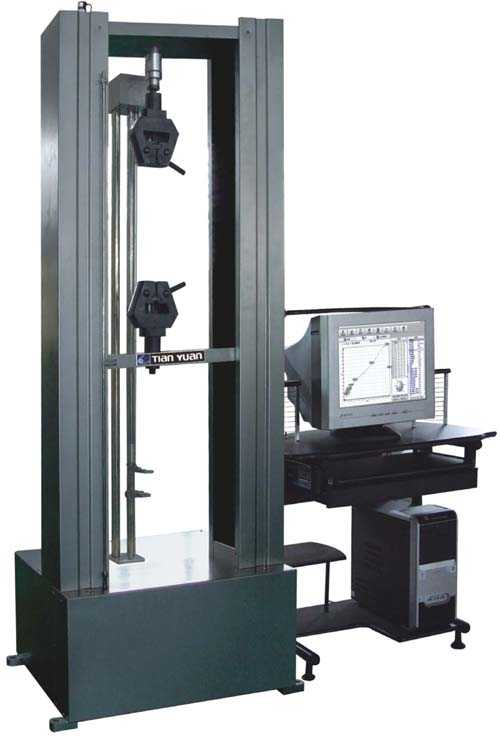Face mask tensile test machine the role of the elongation meter
Tensile testing machine is also known as universal material testing machine, universal testing machine is used for a variety of materials for instrumentation static load, tensile, compression, bending, shear, tear, peel and other mechanical properties of the test machine with mechanical force, for plastic, plates, pipes, profiles, plastic films and rubber, wire and cable, steel, glass fiber and other materials of various physical and mechanical properties of the test for material development, for Physical test, teaching and research, quality control and other indispensable testing equipment, tensile strength machine fixture as an important part of the instrument, different materials require different fixtures, but also the test can be carried out smoothly and the accuracy of the test results of an important factor.
In addition to the fixture, the extensometer is also an indispensable part of the tensile testing machine to do tensile testing, especially for rubber wire and cable and some steel industry.
Tensile machine extensometer is an instrument to measure the line deformation between two points of components and other objects, usually composed of three parts: sensor, amplifier and recorder.

The principle of the extensometer is that the sensor is in direct contact with the component being measured. The distance l between the two points measured on the component is the scale distance, and the change of the scale distance △l (elongation or shortening) is the line deformation. Component deformation, the sensor with the deformation, and this deformation into mechanical, optical, electrical, acoustic and other information, the amplifier will be the sensor output of the small signal amplification. Recorder (or reader) will amplify the signal directly displayed or automatically recorded.
Face mask tensile test machine has many types of extensometer, which can be roughly divided into mechanical extensometer, optical extensometer and electromagnetic extensometer. The sensitivity of these extensometers is generally up to 1 micron. The following types of extensometers are commonly used in tension machines.
Metal extensometer.
Usually applied to the metal material stretching. The metal stretching and other materials and a few differences, first of all, is the speed of stretching and clamping the timing of the lead gauge. Elastic deformation stage, the metal deformation is very small and the tensile load increases rapidly. At this time, if the beam displacement control to do the tensile test, then the speed is too fast will lead to the entire elastic section is quickly washed over.
The yield strength of steel in general is less than 600Mpa, so it only takes 1 second to pull the specimen to yield, this speed is too fast. In GB228-2002, it is recommended that "in the elastic range and up to the yield strength, the separation rate of the testing machine chuck should be kept as constant as possible and within the range of the specified stress rate (material modulus of elasticity E/(N/mm2) < 150,000, the stress rate control range of 2-20 (N/mm2 If only the lower yield strength is measured, the strain rate during yielding of the parallel length of the specimen should be between 0.00025/s and 0.0025/s. Therefore, the strain rate is controlled within the range of the specified stress rate (the material modulus of elasticity E/(N/mm2) <150,000, the stress rate control range is 2-20(N/mm2)?s-1, the material modulus of elasticity E/(N/mm2) ≥150,000, the stress rate control range is 6-60(N/mm2)?s-1.
Therefore, when equipped with a metal extensometer stretching at a rate of 0.2mm/min, the extensometer is removed after stretching 1mm, and then after removing the extensometer it is stretched at a rate of 3mm/min until fracture. It is the most accurate to use the extensometer. Induction meter range is small, generally used in yielding and yielding before use, such as after yielding continue to use, will damage the Induction meter large deformation Induction meter: mainly used to measure the elongation of materials such as rubber and plastic, can be rotated 90 ° to minimize the required working space, usually using the temperature of 5 to 40 ℃ . The required clamping force can be adjusted with a screw knob according to the different materials.

